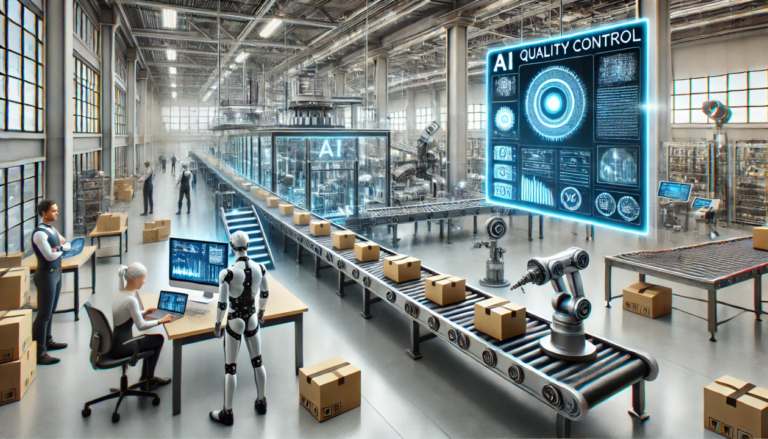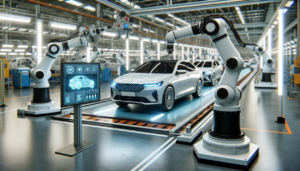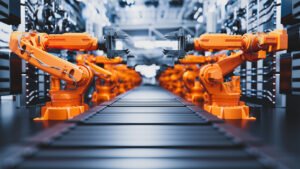
Introduction: The AI Wave in Quality Control
Artificial Intelligence (AI) is rapidly reshaping the manufacturing landscape, bringing efficiency, precision, and scalability to processes that were once manual and time-consuming. Among these advancements, quality control is seeing some of the most transformative changes. Today, we’ll explore how an AI startup is revolutionizing quality control in manufacturing, leading to fewer defects, higher production rates, and significant cost savings.
The Challenge of Traditional Quality Control
Quality control has always been a critical aspect of manufacturing, ensuring that products meet stringent standards before reaching consumers. However, traditional quality control methods have several limitations:
- Manual Inspection: Human inspectors can make errors, leading to inconsistencies in product quality.
- Time-Consuming Processes: Manual inspection of every item is not feasible in high-volume production, leading to random sampling and potential misses.
- High Costs: Extensive quality control processes require significant time, labor, and resources.
These challenges are driving the need for more efficient, accurate, and scalable solutions.

How AI Is Transforming Quality Control
AI technology, particularly in the form of machine learning and computer vision, is addressing the limitations of traditional quality control. Here’s how:
1. Automated Defect Detection
AI-powered systems can inspect products at speeds and accuracy levels unattainable by humans. By using machine learning algorithms, these systems learn from thousands of images to detect even the smallest defects in real-time.
2. Real-Time Analysis and Feedback
AI systems provide instant feedback, allowing manufacturers to make immediate adjustments to the production process. This reduces the number of defective products and minimizes waste.
3. Scalability and Flexibility
Unlike human inspectors, AI systems can easily scale to inspect large volumes of products without a drop in performance. They can also be trained to adapt to new products and quality standards, making them highly flexible.
4. Cost Efficiency
By reducing the need for manual inspections and minimizing defects, AI-driven quality control significantly lowers operational costs. The savings can be reinvested into further optimizing the manufacturing process.

Case Study: The AI Startup Leading the Charge
One standout AI startup in this space is revolutionizing quality control in the manufacturing sector. Let’s delve into how this company is making waves.
Company Background
This startup, founded by experts in AI and manufacturing, focuses on integrating advanced AI technology with existing manufacturing systems. Their mission is to enhance the quality control process while reducing costs and increasing efficiency.
Innovative AI Solutions
The startup’s flagship product is an AI-powered quality control platform that uses deep learning algorithms to identify defects with pinpoint accuracy. Here’s how it works:
- Data-Driven Insights: The platform collects and analyzes data from every stage of the production process, identifying patterns and trends that could lead to defects.
- Customizable Algorithms: Manufacturers can customize the AI algorithms based on their specific quality standards, ensuring the system meets their unique needs.
- User-Friendly Interface: The platform features an intuitive interface that allows operators to easily monitor production quality in real-time.
Impact on the Manufacturing Industry
Since its launch, the startup has helped numerous manufacturers significantly reduce defect rates, improve product quality, and achieve faster production times. Their technology is now being adopted across various industries, including automotive, electronics, and consumer goods.
The Future of Quality Control in Manufacturing
As AI technology continues to evolve, its applications in quality control will only expand. We can expect to see:
- Predictive Quality Control: AI systems will not only detect defects but also predict potential quality issues before they occur, allowing manufacturers to proactively address them.
- Integration with IoT: Combining AI with the Internet of Things (IoT) will enable real-time monitoring and quality control across entire production lines, further enhancing efficiency.
- AI-Driven Continuous Improvement: By analyzing production data over time, AI can suggest improvements to the manufacturing process, leading to continuous quality enhancements.
Conclusion: Embracing the AI-Driven Future
The AI startup revolutionizing quality control in manufacturing is just the beginning of what AI can achieve in this space. By embracing AI, manufacturers can ensure higher product quality, reduce waste, and stay competitive in a rapidly changing market.